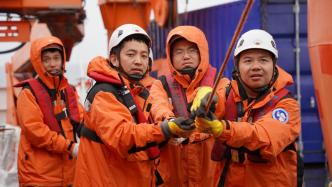
After 15 days of sea voyage, China's 13th Arctic Ocean Scientific Expedition Team arrived at the first operation site in the Chukchi Sea on the afternoon of the 26th Beijing time, and officially started the ocean scientific research operation. The first station operation lasted about 5 hours and 30 minutes, and ended at about 22:30 on the same day, basically covering most of the routine operations of this Arctic Ocean scientific expedition.
According to the scheduled operation plan, the first oceanic scientific research operation will be carried out on the midship deck, the stern deck and the 9th deck. Midship deck operations include CTD (Temperature, Salt and Depth Multi-parameter Ocean Observation System), water harvesting operations, plankton vertical trawling sampling and ocean optical observations. On the stern deck, particle profile observations, box-type sediment sampling, microplastic trawl sampling, benthic trawling operations, and deployment of submarine buoys and wave buoys were carried out successively. The operation project on the 9th deck is the deployment of meteorological sounding balloons.
Chen Chao, the leader of the ocean team of the expedition team, said that the ocean team under the expedition team is composed of 45 scientific researchers from relevant units and universities, and they are the main body to carry out ocean scientific research operations. According to the content of the work, the scientific researchers divided them into 8 groups: hydrological environment, water body chemistry, atmospheric environment, midship biology, stern biology, pollution and sedimentation, geology and geophysics, and sea ice environment.
Wang Jinhui, the leader of the expedition team, said that the Arctic Ocean scientific expedition lasted more than 40 days, and the time was relatively tight. Compared with the previous two scientific expeditions, the number of tasks was increased, especially in ice and snow observation, buoys and submerged buoys. . Compared with the previous scientific expeditions in the Arctic Ocean, there are more ice floes and thicker sea fog on the routes in the Arctic Circle this time, which objectively increases the difficulty of related operations.
Wang Jinhui said that the expedition team will offset the adverse effects caused by complex ice conditions and severe weather by strengthening task coordination and carrying out simultaneous operations. In the follow-up work, the expedition team will continue to focus on hydrology, atmosphere, biology and other disciplines, step up the progress of the work, and strive to successfully complete various scientific research tasks.